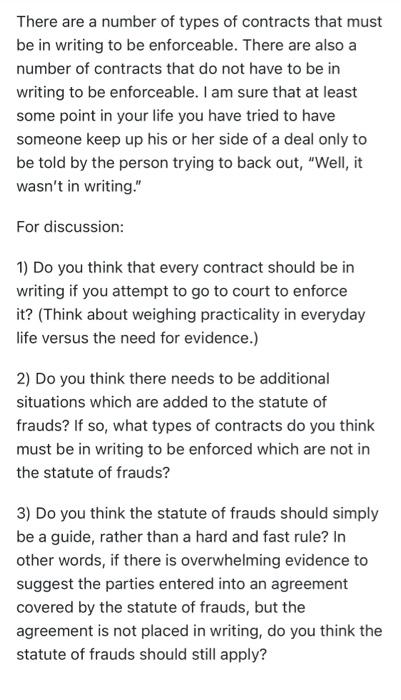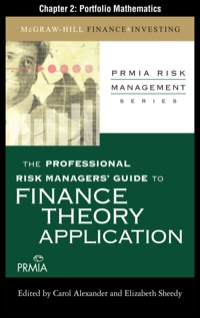Answered step by step
Verified Expert Solution
Question
1 Approved Answer
I need help with this question There are a number of types of contracts that must be in writing to be enforceable. There are also
I need help with this question 
There are a number of types of contracts that must be in writing to be enforceable. There are also a number of contracts that do not have to be in writing to be enforceable. I am sure that at least some point in your life you have tried to have someone keep up his or her side of a deal only to be told by the person trying to back out, "Well, it wasn't in writing." For discussion: 1) Do you think that every contract should be in writing if you attempt to go to court to enforce it? (Think about weighing practicality in everyday life versus the need for evidence.) 2) Do you think there needs to be additional situations which are added to the statute of frauds? If so, what types of contracts do you think must be in writing to be enforced which are not in the statute of frauds? 3) Do you think the statute of frauds should simply be a guide, rather than a hard and fast rule? In other words, if there is overwhelming evidence to suggest the parties entered into an agreement covered by the statute of frauds, but the agreement is not placed in writing, do you think the statute of frauds should still apply? There are a number of types of contracts that must be in writing to be enforceable. There are also a number of contracts that do not have to be in writing to be enforceable. I am sure that at least some point in your life you have tried to have someone keep up his or her side of a deal only to be told by the person trying to back out, "Well, it wasn't in writing." For discussion: 1) Do you think that every contract should be in writing if you attempt to go to court to enforce it? (Think about weighing practicality in everyday life versus the need for evidence.) 2) Do you think there needs to be additional situations which are added to the statute of frauds? If so, what types of contracts do you think must be in writing to be enforced which are not in the statute of frauds? 3) Do you think the statute of frauds should simply be a guide, rather than a hard and fast rule? In other words, if there is overwhelming evidence to suggest the parties entered into an agreement covered by the statute of frauds, but the agreement is not placed in writing, do you think the statute of frauds should still apply 
Step by Step Solution
There are 3 Steps involved in it
Step: 1

Get Instant Access to Expert-Tailored Solutions
See step-by-step solutions with expert insights and AI powered tools for academic success
Step: 2

Step: 3

Ace Your Homework with AI
Get the answers you need in no time with our AI-driven, step-by-step assistance
Get Started


